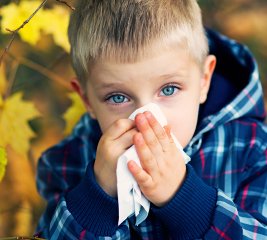
When the days grow shorter and there’s a nip in the air, it’s time to think about flu season. As COVID-19 continues to circulate, preventive measures remain extra important. What can you do to protect yourself and your family this year — and what should you do if you or a loved one gets sick? Here are five tips that can help.
- Get vaccinated — against both COVID-19 and the flu.
COVID-19 vaccines are safe, effective, free and recommended for everyone ages 5 or older living in the U.S. The vaccines can help protect you against severe disease and death.
Everyone six months and older should also get a flu shot every year, with very few exceptions. This is especially important for people who are at higher risk of complications from the flu. This includes those who:
- Are 65 or older
- Are pregnant
- Have health conditions such as asthma, heart disease, stroke or diabetes
- Are from certain racial or ethnic minority groups, including non-Hispanic Black people, Hispanic or Latino people, and American Indian or Alaska Native people
Different flu shots have been approved for different age ranges. It doesn’t matter which one you get as long as it’s approved for your age. There are also versions of the vaccine that have additional ingredients to better protect adults ages 65 and older. For those who have severe egg allergies, egg-free vaccines are available. For people ages 2 through 49, there is a nasal spray version of the shot that can be used instead of an injection.
With both COVID-19 and the flu, getting vaccinated is one of the most effective ways to lower your chances of getting sick and to help reduce the spread of these viruses in your community. While it’s still possible to get infected with COVID-19 or the flu after you’ve been vaccinated, in both cases it’s likely you’ll have a milder illness.
The CDC recommends getting your yearly flu shot by the end of October. If you miss that date, you can still benefit if you get vaccinated while the flu is circulating. (Flu activity usually peaks December through March, with cases sometime extending into May.) You can get flu and COVID-19 vaccines — including COVID-19 booster shots — at the same time.
- Know the similarities — and differences — between COVID-19 and the flu.
Both are contagious respiratory illnesses, and they can have similar symptoms, including:
- Fever/chills
- Coughing
- Difficulty breathing
- Fatigue
- Sore throat
- Runny or stuffy nose
- Body aches
- Headaches
- Vomiting
- Diarrhea
COVID-19 is also known to sometimes cause changes in or a loss of taste or smell. This can also happen with the flu, but it’s less likely.
There are also important differences to be aware of. In particular, COVID-19 can:
- Spread more easily
- Cause more serious illness
- Take longer before you show symptoms
- Make you contagious for longer (including while you don’t have symptoms)
- Cause symptoms that last well beyond the initial illness
- Get tested if you have symptoms.
Because COVID-19 and the flu have so many symptoms in common, getting tested is the best way for you to get the right diagnosis and treatment. It’s also possible to be infected with both viruses at once (though unlikely), and testing can confirm if that’s the case.
If you have the flu, chances are you’ll recover without medication. But if you are at higher risk for complications, there are antiviral medications that can make your illness milder or prevent serious complications like pneumonia. These medications require a prescription and work best when taken soon after you become ill, so it’s important to get tested promptly.
While there are few medications approved for COVID-19, there are some emerging treatments that may be prescribed on an emergency-use basis. Getting tested is an important step to finding out if you’re eligible for one of these treatments. It’s also important to find out if you’re infected so you can take additional steps to prevent spreading it to others.
- Take precautions.
- Wear a mask while you’re in indoor public spaces with a high risk of transmission — even if you’re vaccinated against COVID-19 and in all indoor spaces if you aren’t yet fully vaccinated.
- Avoid contact with people who are ill.
- Wash your hands often. Use soap and water for at least 20 seconds. If you can’t wash, use a hand sanitizer with at least 60% alcohol.
- Cover your nose and mouth with a tissue when you sneeze or cough, then throw the tissue away.
- Avoid touching your face, including your eyes, nose and mouth.
- Clean and disinfect frequently touched surfaces or objects in your home.
- If you get sick, stay home so you don’t infect others. If you have been diagnosed with — or suspect you have — COVID-19, isolate yourself as much as possible from others (including pets!) in your home. Wear a mask if you must be in contact with them.
- If you have symptoms and aren’t sure if it could be COVID-19 or the flu, try not to panic. LiveHealth Online doctors are here 24/7 for care.
Telehealth can be your first line of defense for the flu and COVID-19.
If you’re not feeling well, you can get advice from a doctor anytime. Whether you’re looking to limit your contact with germs, are at a higher risk for severe illness or simply want convenient care from home, you can have an online visit in minutes.
Recommended Posts


